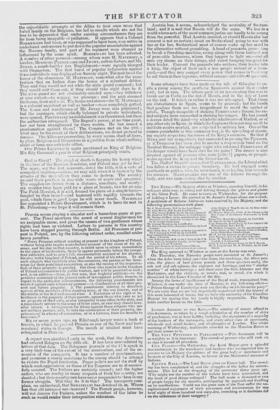Prussia seems playing a singular and a hazardous game at
pre- sent. The Times mentions the arrest of several Englishmen for no assignable cause, and gives the names of two gentlemen whose rights had been so violated. Letters to persons in this country have been stopped passing through Berlin. All Prussians at pre- sent in Poland, are, by the following cabinet order, recalled under heavy penalties. "Every Prussian subject residing at present in the kingdom of Poland, without being able to give asatisfactory account of the cause of his ab- sence, and his stay in that country, is called upon to return immediately to the place of his domicile, there to appear personally before the compe- tent authority, and to give a full, circumstantial account of his absence, his stay in the kingdom of Poland, and the period of his return. To all such subjects who faithfully obey this summons, the pardon of the Sove- reign for their prohibited emigration, as also the raising of the sequestra- tion of their property, is granted. But those who remain in the kingdom of Poland are considered as public traitors, and will be punished as such ; and, as an addition—(hear, ye free men, that frightful addition)—to the penalties contained in the general code of laws against public treason, in regard to the particular circumstances, the following punishments are enacted against such refractory persons :-1. Confiscation of all their pre- sent and future property. 2. The punishment relating to desertion against all the members of the standing army, of the war reserve, and of the militia of the first and second class. 3. Forfeiture of the right of in- heritance to the property of their parents, ag,aiast those who have as yet no property of their own, as also incapacity to any office in the state, and a compulsory service in the army of three years, in case they should here- after return. 4. Arraignment for felony against those subjects who are not military persons, and, besides the confiscation of their property, im- prisonment in a house of correction, or in a fortress, from six months to two years."
Six or seven years ago, an Edinburgh lawyer *rote a book of travels, in which he praised Prussia as one of the finest and best- regulated states in Europe. The march of intellect must have retrograded in Prussia.


























 Previous page
Previous page